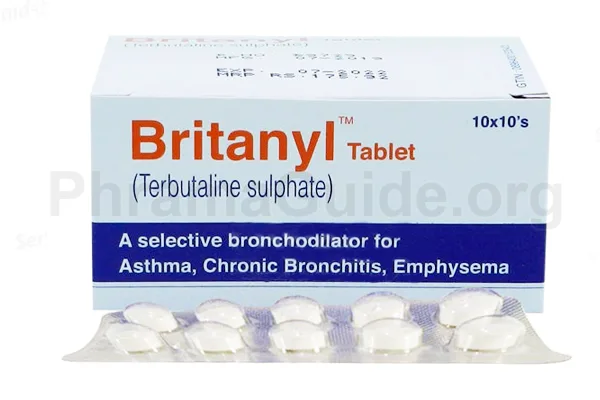Britanyl tablet is primarily used for the treatment of respiratory conditions that cause bronchoconstriction (narrowing of the airways). It belongs to the class of drugs known as beta-2 adrenergic agonists. Following are some common and off-label uses of Britanyl Tablet:
Common Uses of Britanyl Tablet
- Asthma: Britanyl tablet is commonly used for the relief of bronchospasm (narrowing of the airways) in people with asthma. It helps to relax the smooth muscles in the airways, opening them up and improving breathing.
- Chronic Obstructive Pulmonary Disease (COPD): Britanyl tablets may be used in the treatment of COPD, a progressive lung disease characterized by airflow limitation. It can help relieve bronchospasm and improve breathing in individuals with COPD.
- Bronchospasm Prevention: Britanyl tablets can be used as a preventive measure to reduce the frequency and severity of bronchospasm triggered by factors such as exercise or exposure to allergens or irritants.
Off-label Uses of Britanyl Tablet
- Acute Bronchitis: Britanyl tablets may be used off-label to relieve symptoms of acute bronchitis, such as cough and wheezing. It can help relax the airway’s smooth muscles and improve breathing.
- Allergic Rhinitis: Britanyl tablets may be used as an adjunctive treatment for allergic rhinitis, also known as hay fever. It can help alleviate nasal congestion and improve airflow in individuals with allergic rhinitis.
- Chronic Cough: Britanyl tablets may be used for the management of chronic cough that is not responsive to other treatments. It can help relax the airways and reduce coughing episodes.
- Uterine Relaxation in Fetal Distress: In certain situations of fetal distress during pregnancy, Britanyl tablets may be used to relax the uterus and improve blood flow to the baby. This use is typically reserved for specific medical emergencies and is closely monitored by healthcare professionals.

What is Britanyl?
Britanyl is one of the leading brands of Terbutaline, manufactured and marketed by Barrett Hodgson Pakistan (Pvt) Ltd.
Britanyl Alternatives : Other Similar Brands
Below are some available similar brands that can be used as an alternative to Britanyl tablets:
- Brethin : Platinum Pharmaceuticals (Pvt) Ltd. Pakistan
- Turbutascot : Scotmann Pharmaceuticals, Pakistan
- Tesmic : Zafa Pharmaceutical Laboratories (Pvt) Ltd. Pakistan
- Ventair : Schazoo Zaka Pharmaceuticals, Pakistan
- Webolax : Webros Pharmaceuticals, Pakistan
- Maxair : Siza International (Pvt) Ltd. Pakistan
- Turbulin : Bryon Pharmaceuticals (Pvt) Ltd. Pakistan
- Butalin : Akson Pharmaceuticals (Pvt) Ltd. Pakistan
- Terbutil : Pakheim International Pharma, Pakistan
Britanyl : Available Formulations and Strengths
Presently, Britanyl is available in Tablet, Syrup, and Injection Forms with the following strengths.
Britanyl Tablet : 2.5mg strength.
Britanyl Syrup : 0.3mg/ml strength.
Who Should Not Use Britanyl?
There are some important contraindications that should be considered before using the Britanyl tablet.
Hypersensitivity: Britanyl is contraindicated in individuals who have a known hypersensitivity or allergy to Britanyl or any of its components.
Tachyarrhythmias: Britanyl should be used with caution or avoided in individuals with a history of tachyarrhythmias (abnormally rapid heart rhythms) such as tachycardia or atrial fibrillation. The medication can potentially exacerbate these conditions and increase the risk of cardiovascular complications.
Coronary artery disease: Britanyl may be contraindicated in individuals with significant coronary artery disease or a history of myocardial infarction (heart attack). The medication can have stimulatory effects on the cardiovascular system and may increase heart rate and blood pressure, potentially straining the heart in individuals with underlying cardiac conditions.
Uncontrolled hypertension: Britanyl should be used with caution or avoided in individuals with uncontrolled hypertension (high blood pressure). The medication can cause an increase in blood pressure, and its use in individuals with uncontrolled hypertension may further elevate blood pressure to potentially dangerous levels.
Severe renal impairment: Britanyl should be used with caution or avoided in individuals with severe renal impairment (severe kidney dysfunction). The medication is primarily eliminated from the body through the kidneys, and impaired kidney function can lead to a buildup of Britanyl, increasing the risk of adverse effects.
Severe hepatic impairment: Britanyl should be used with caution or avoided in individuals with severe hepatic impairment (severe liver dysfunction). The medication is metabolized by the liver, and impaired liver function can affect its clearance from the body, potentially leading to an increased risk of side effects.
What is the Recommended Daily Dosage of Britanyl?
Britanyl Tablet Dose for Asthma and Chronic Obstructive Pulmonary Disease (COPD):
- For adults: 1 to 2 tablets of 2.5mg taken orally every 6 to 8 hours.
- The maximum daily dose is usually 15mg.
Britanyl Tablet Dose for Bronchospasm Prevention:
- For Adults: Two tablets of 2.5mg taken orally 30 minutes to 1 hour before exercise or exposure to triggers.
How Britanyl Works?
Britanyl acts on the smooth muscles of the airways, specifically the bronchioles (smaller air passages), causing relaxation and dilation. By activating the beta-2 adrenergic receptors in the airway smooth muscles, Britanyl helps to relieve bronchospasm (narrowing of the airways) and improve airflow in conditions such as asthma and COPD.

Leave A Comment